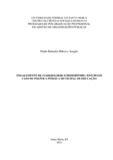| dc.creator | Aragão, Paula Balardin Ribeiro | |
| dc.date.accessioned | 2021-12-09T16:37:23Z | |
| dc.date.available | 2021-12-09T16:37:23Z | |
| dc.date.issued | 2021-08-27 | |
| dc.identifier.uri | http://repositorio.ufsm.br/handle/1/23211 | |
| dc.description.abstract | This research sought to analyze what is the relationship between different levels of stakeholder engagement and the performance of the municipal education public policy "COMDECampo" of Cachoeira do Sul - RS? As specific objectives, it was established: i) to map the stakeholders of the municipal public policy of education; ii) to verify the perception of stakeholder groups in relation to levels of engagement; iii) to evaluate how levels of engagement affect the perception of policy performance; iv) to propose strategies to improve stakeholder engagement. This is a case study, with a quantitative approach. The stakeholders of the municipal public policy of education were mapped, applying the questionnaire prepared by the author based on the study by Bowen et al. (2010) that proposes engagement on three levels: transactional, transitional and transformational, consisting of 24 statements related to public policy, on a 5-point Likert scale. The survey considered the fourteen rural schools in the municipality, which resulted in a sample of 60 respondents, being principals, teachers, and public policy members. The statistical tests of Kruskall-Wallis, Correlation, and Multiple Linear Regression showed, mainly by the increasing coefficients of R2 (32%, 37%, and 44%) that engagement not only affects the stakeholders' perception of performance, but this perception also increases as the level of engagement increases. It was also possible to observe that different stakeholder groups have different perceptions of engagement levels, which allows us to understand which type of strategy is most appropriate. In addition, the research proposes some stakeholder engagement strategies, demonstrating the importance of stakeholder engagement for the success of a public policy. | eng |
| dc.language | por | por |
| dc.publisher | Universidade Federal de Santa Maria | por |
| dc.rights | Attribution-NonCommercial-NoDerivatives 4.0 International | * |
| dc.rights.uri | http://creativecommons.org/licenses/by-nc-nd/4.0/ | * |
| dc.subject | Stakeholders | por |
| dc.subject | Engajamento | por |
| dc.subject | Desempenho | por |
| dc.subject | Políticas públicas | por |
| dc.subject | Engagement | eng |
| dc.subject | Performance | eng |
| dc.subject | Public policies | eng |
| dc.title | Engajamento de stakeholders e desempenho: estudo de caso de política pública municipal de educação | por |
| dc.title.alternative | Stakeholder engagement and performance: case study of a municipal education public policy | eng |
| dc.type | Dissertação | por |
| dc.description.resumo | A presente pesquisa buscou analisar qual a relação entre os diferentes níveis de engajamento de stakeholders com o desempenho da política pública de educação municipal “COMDECampo” de Cachoeira do Sul - RS? Como objetivos específicos, foram estabelecidos: i) mapear os stakeholders da política pública municipal de educação; ii) verificar a percepção dos grupos de stakeholders em relação aos níveis de engajamento; iii) avaliar como os níveis de engajamento afetam a percepção de desempenho da política; iv) propor estratégias para melhorar o engajamento dos stakeholders. Trata-se de um estudo de caso, com abordagem quantitativa. Foram mapeados os stakeholders da política pública municipal de educação, aplicando o questionário elaborado pela autora com base no estudo de Bowen et al. (2010) que propõe o engajamento em três níveis: transacional, transitório e transformacional, sendo composto por 24 afirmativas relacionadas à política pública, em uma escala likert de 5 pontos. A pesquisa considerou as quatorze escolas rurais do município, o que resultou uma amostra de 60 respondentes, sendo diretores, professores e membros da política pública. Os testes estatísticos de Kruskall-Wallis, Correlação e Regressão Linear Múltipla evidenciaram, principalmente pelos coeficientes crescentes de R² (32%, 37% e 44%) que o engajamento não somente afeta a percepção de desempenho por parte dos stakeholders, como essa percepção também cresce conforme cresce o nível de engajamento. Também foi possível observar que diferentes grupos de stakeholders possuem diferentes percepções dos níveis de engajamento, o que permite entender que tipo de estratégia é mais indicada. Além disso, a pesquisa propõe algumas estratégias de engajamento de stakeholders, demonstrando a importância do envolvimento das partes para o sucesso de uma política pública. | por |
| dc.contributor.advisor1 | Sarturi, Greici | |
| dc.contributor.advisor1Lattes | http://lattes.cnpq.br/4537029350400077 | por |
| dc.contributor.referee1 | Mascena, Keysa Manuela Cunha de | |
| dc.contributor.referee2 | Klein, Leander Luiz | |
| dc.creator.Lattes | http://lattes.cnpq.br/9401474619296792 | por |
| dc.publisher.country | Brasil | por |
| dc.publisher.department | Administração Pública | por |
| dc.publisher.initials | UFSM | por |
| dc.publisher.program | Programa de Pós-Graduação em Gestão de Organizações Públicas | por |
| dc.subject.cnpq | CNPQ::CIENCIAS SOCIAIS APLICADAS::ADMINISTRACAO::ADMINISTRACAO PUBLICA | por |
| dc.publisher.unidade | Centro de Ciências Sociais e Humanas | por |



